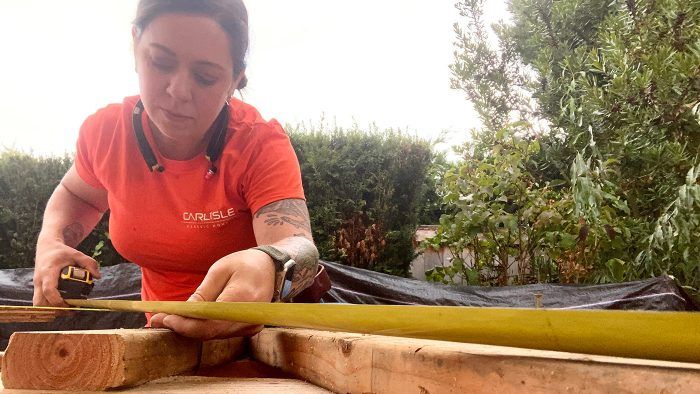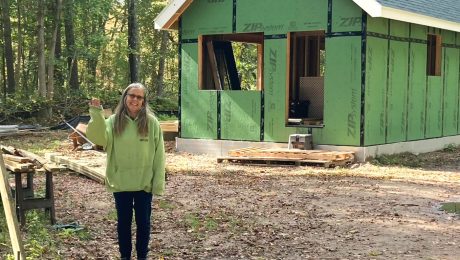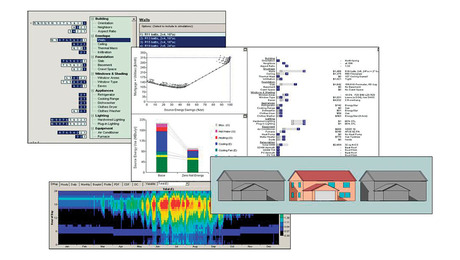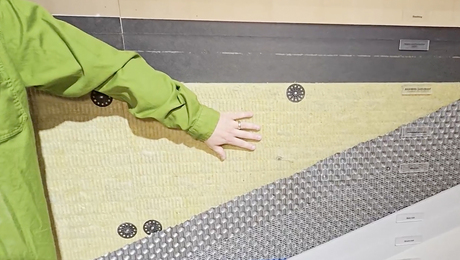Academics Don’t Define Real-World Abilities
Carpenter Dejah Leger talks about how grades in school aren't good indicators of building skills and how the job site made math make sense.

Here’s my not-so-humble brag: This week, I calculated a lumber take-off, squared my foundation by finding the hypotenuse of a giant right triangle, did layout for my framing down to 1/8 in., and headed off several structural issues by running some “mental images” based on the current math.
Why does this warrant bragging rights? Because I nearly failed every math class at every stage in my academic life. I’ve never received above a C in any math class. I failed algebra three years in a row and was sent to remedial courses. Geometry? I barely scraped by. I have dyscalculia, a learning disorder sometimes called “math dyslexia,” which means I can’t calculate even basic equations in my head. I chalked it all up to just being a “creative” artist. Any member of my family will tell you that I am infamous for not understanding numbers and when I told my friends I was going to be a carpenter, there were plenty of raised eyebrows and speculation about how long I would last in an industry where basic math is a baseline requirement.
Why math started to make sense
But somehow when I see a structure, the math becomes more obvious—I can find the math in real space where I could never find it on paper in a classroom. Solving for X or Y continues to baffle, but solving for roof loads and cantilever points makes sense. I can’t do math in my head, but I can write down a series of numbers and precut all my trim with total confidence. I can’t explain why the Pythagorean Theorem works, but I can show you how to make sure a wall is square and true.
In other words, my ability to excel at my job was not accurately reflected in my high school report cards. According to school metrics, I was on-track to be a writer or an artist (both of which I did, in fact, make a career of for a while), but the idea that I could be responsible for doing a lumber takeoff package for someone’s house was wholly absurd by those standards. All of which to say, the metrics by which we define intelligence should never be constrained to a letter grade or the methods used to calculate it.
“Having to recut several studs is a real-life consequence of learning about fractions, whereas the fractions I had to calculate on paper in algebra stubbornly refused to make sense to me.”
Using math on the job site
My job-site math competence didn’t happen overnight, however. Even reading a tape measure mortified me when I first began using one in the field. How could I do anything with confidence when I didn’t know that 5/8 in. was less than ¾ in., or when I had to count every little 1/16th mark while someone waited impatiently for a measurement? My mortification deepened when there were real-world consequences to not understanding fractions—it wasn’t a matter of a wrong answer on a test, it was a matter of a wrong supporting stud in a wall.
Using valuable time and materials while I made multiple trips back to the cut station became a great motivator to learn real math fast, but my biggest breakthrough came when I was doing cabinet layouts.
My “creative brain” that always served me well with spatial visualization suddenly had a new language to speak in. I learned the 3-4-5 method of finding square (the Pythagorean theorem)—or more accurately, I learned how to quickly get diagonals on my construction calculator—and from there it was a matter of assigning numbers to physical space. My confidence began to expand every time I did a layout, and I began to understand the larger picture of how geometry is all around us in tangible, real-life scenarios.
Redefining intelligence
When I recently posted this sentiment on my social media page, I got over a hundred responses in the first week. Something struck a chord for a lot of people about recognizing that doing well in school and doing well in the field are not cross-indicators of success. Building-industry colleagues who I consider to be among the brightest minds I know have admitted to being horrible at math or English classes. Conversely, friends who were very successful in academia admitted to being nervous about how well they would perform in the trades. Others found that their understanding of “intelligence” changed once they were able to embody a tangible concept rather than give a right or wrong answer on a test. For example, having to recut several studs is a real-life consequence of learning about fractions, whereas the fractions I had to calculate on paper in algebra stubbornly refused to make sense to me.
Setting future tradespeople up for success
There are a few takeaways from my experience that I want to emphasize. The first is that intelligence is broad and manifests in a variety of ways. If we limit our career choices based on a very narrow set of indicators communicated by the current pedagogy at academic institutions, we may likely miss opportunities to excel in an unexpected field.
Second, it is my deep wish to keep or bring back woodshop, home economics, metal shop, and other timeless skills and crafts to high schools. If my high school had offered woodshop, I may have been exposed to off-text math much sooner. I would have spent less time wondering if I was dumber than a bag of hammers and more time using one.
My advice to those who see arithmetic as an obstacle to finding a career in the building trades is to remember two things. Math is different when there are real-world applications and consequences. It becomes contextual, not abstract, and the math serves a purpose. It’s integrated into the task you perform and doesn’t feel as random or untethered as it does in a textbook. The second thing is that a construction calculator fits in your pocket. I even have an app (Construction Master Pro) on my phone, and I don’t hesitate to use it for even the most trivial equations.
In the end, I’ll take my not-so-humble brag and use it to remind myself that the things I felt were impossible just needed to be understood in a different way. Don’t let a bad grade in geometry keep you from building an addition. Struggling in your high school science class doesn’t mean you can’t be a rockstar at understanding building envelopes. Failing art class doesn’t mean you can’t learn how to draw up someone’s dream home. We all learn in different ways, and the building trades may very well draw out skill sets that were just waiting for the right way to manifest.
Dejah Léger is a carpenter and superintendent at Carlisle Classic Homes.
Photo courtesy of Dejah Leger.
From Fine Homebuilding #313
RELATED STORIES





























View Comments
And on the other hand, Dejah's artistic and writing experience comes out in an essay that integrates several sources into a well-written, organized and easy-to-read whole that's more than the sum of its parts.
Great article. This was exactly my experience, including my friends not expecting me to be any good as a carpenter and being a writer (including two articles for FH) with photography as an avocation. I flunked algebra four times, not three, but who's counting? I developed carpal tunnel after a twenty-year career, and finally became a professional photographer in the digital world where at first I was not terribly competent - but got there in part because of how much I learned in the trades about process and critical thinking. Thanks so much for this.